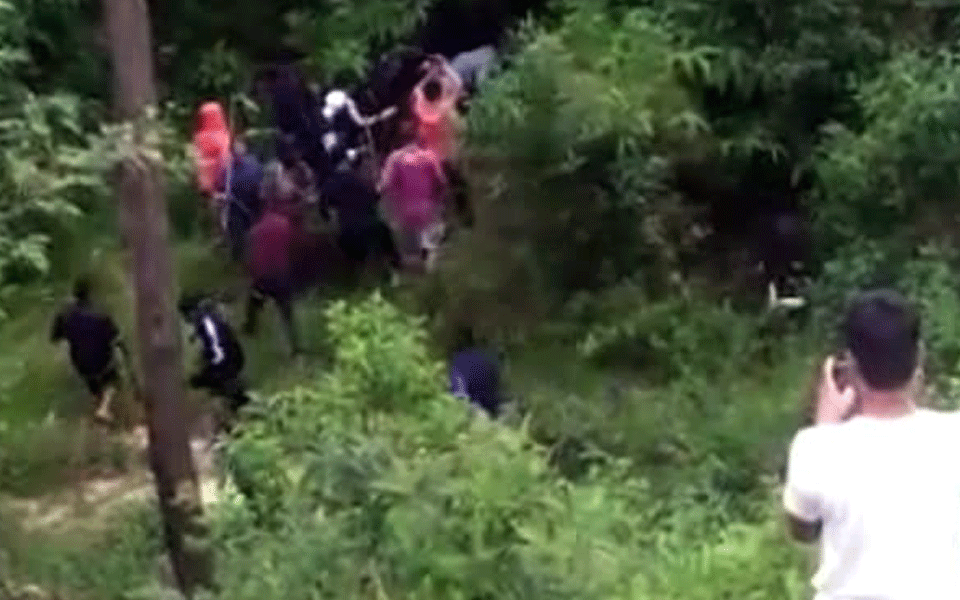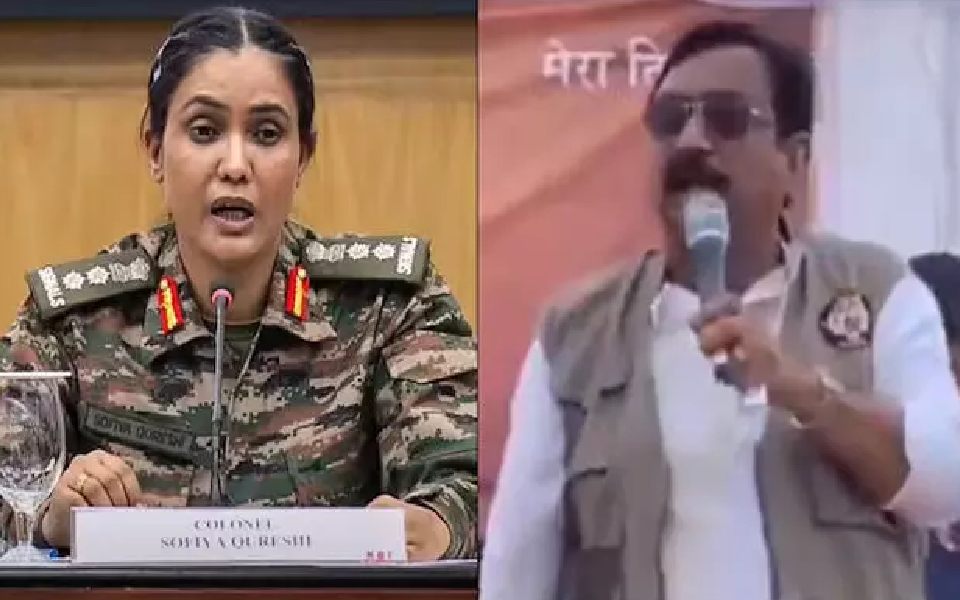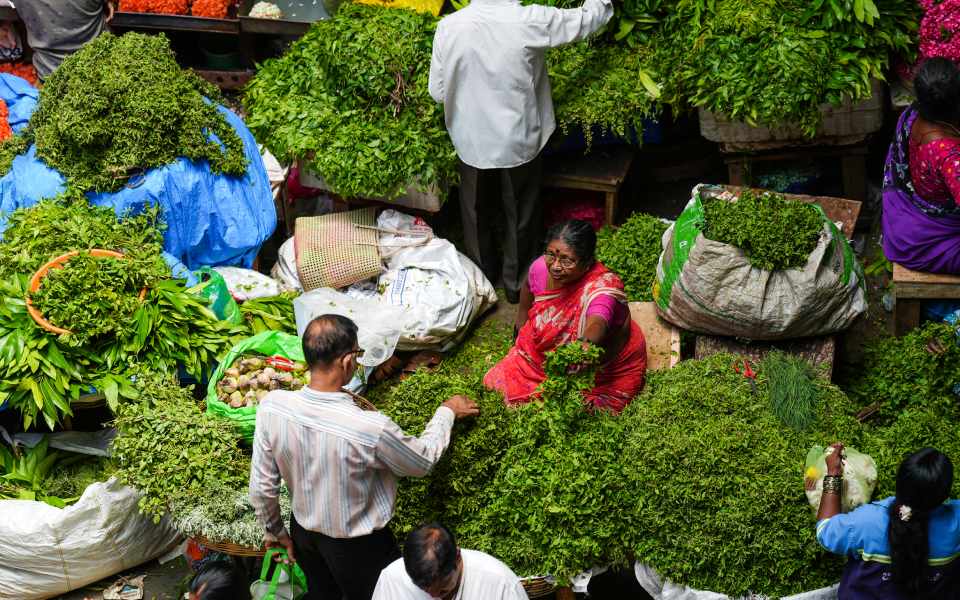Shillong, (PTI): Four of six undertrial prisoners, who escaped from the Jowai jail, were allegedly killed by a mob in Shangpung village in the West Jaintia Hills district on Sunday, police said.
A group of six prisoners overpowered the staff at Jowai jail on Saturday and escaped. Five of them reached Shangpung on Sunday, about 70 km away from the prison, a senior officer said.
Around 3 pm of Sunday, when one of the prisoners went to a tea shop to buy food, he was identified by the locals and the entire area was alerted, village headman R Rabon told PTI.
A large number of people turned up and chased the group of prisoners to a nearby forest. A purported video of the incident showed angry villagers, armed with sticks, apprehending the prisoners and beating them mercilessly.
Four prisoners died in the attack while one managed to escape, Rabon said.
Inspector-General of Prisons JK Marak said, "It is true that a group of villagers apprehended four of the escaped prisoners and subsequently lynched them. Our officers have reached the area and I am awaiting more information."
Officials said that one of the prisoners Ramesh Dkhar managed to escape from the mob, while the sixth prisoner was nowhere to be seen during the attack.
"Two prisoners had been arrested in the murders of taxi drivers in August," police said.
Superintendent of Police of West Jaintia Hills BK Marak said police officers are at the spot and ‘conducting spot inquiry and other necessary formalities’.
"A case has been registered in the Jowai police station against the prison staff and five of them have been arrested so far. Among the arrested prison staffers are one head warden and four wardens," he said.
Let the Truth be known. If you read VB and like VB, please be a VB Supporter and Help us deliver the Truth to one and all.
Bhopal/Indore, May 13 (PTI): Madhya Pradesh Minister and BJP leader Vijay Shah has sparked a major controversy with objectionable comments that appeared to be directed at Col Sofia Qureshi, whom he tried to project as a "sister of terrorists."
Under severe flak, Shah said if anyone is hurt by his statement, he is ready to apologise ten times, adding that he respects Colonel Qureshi more than his sister.
The Congress has appealed to Prime Minister Narendra Modi to sack Shah from the Madhya Pradesh cabinet.
Colonel Qureshi had conducted regular press briefings, sharing details of the 'Operation Sindoor' launched by Indian armed forces to strike terrorists, joined by Foreign Secretary Vikram Misri and Wing Commander Vyomika Singh.
"Those people (terrorists) who had wiped out the sindoor (vermilion) of our sisters (in the Pahalgam terror attack)..We avenged these 'kate-pite' people by sending their sister to destroy them," Shah said.
"They (terrorists) killed our Hindu brothers by making them remove their clothes. PM Modi ji responded by sending their (terrorists') sister in an Army plane to strike them in their houses. They (terrorists) made our sisters widows, so Modiji sent the sister of their community to strip them and teach them a lesson", the BJP leader said while addressing a gathering in Ramkunda village near Indore.
He said, "Revenge was taken for the honour of our country (India), respect, and for the (slain) husbands of our sisters by sending a sister from your (terrorists') community to Pakistan".
The tribal welfare minister clarified that his remarks should not be construed otherwise.
Shah's remarks drew wide-scale condemnation, with Congress demanding his immediate dismissal from the MP cabinet.
Congress President Mallikarjun Kharge said Shah, who made 'derogatory' remarks in reference to Colonel Sofia Qureshi, should be dismissed immediately.
"A minister of the BJP government of Madhya Pradesh has made a very derogatory, shameful and cheap remark about our brave daughter Colonel Sofia Qureshi. The terrorists of Pahalgam wanted to divide the country, but the country was united during the entire 'Operation Sindoor' to give a befitting reply to the terrorists," Kharge posted on X.
He alleged that the BJP-RSS harbours an anti-women mentality.
"First, the wife of the naval officer martyred in Pahalgam was trolled on social media, then the daughter of Foreign Secretary Vikram Misri was harassed, and now the BJP ministers are making such indecent comments about our brave woman Sophia Qureshi," Kharge said and appealed to PM Modi to immediately sack Shah.
Madhya Pradesh Congress president Jitu Patwari shared the video of Shah on X and asked whether the BJP agrees with the minister's "low thinking"?
The MP Congress Committee alleged that Shah's "indecent' and hate-filled" statement is not just a personal attack, but an open attack on India's military dignity, national unity, and women's honour.
Amid the raging controversy, the BJP's Madhya Pradesh general secretary Hitanand Sharma summoned Shah to the state headquarters in Bhopal.
According to sources, Sharma reprimanded the minister, who also met the state BJP president, Vishnu Dutt Sharma.
Speaking to reporters, Shah sought to attribute the intemperate remarks to his "disturbed" state of mind in view of the brutal killing of innocent people in Pahalgam by terrorists.
He claimed many members of his family have a military background and many were martyred.
"Sister Sophia has brought glory to India by rising above caste and religion. She is more respected than our own sister. I salute her for her service to the nation.
"We cannot even think of insulting her in our dreams. Still, if my words have hurt society and religion, then I am ready to apologise ten times,'' he added.
Meanwhile, Congress leader Manoj Shukla and the party workers blackened the nameplate of Shah at his bungalow and raised slogans seeking his resignation.
'हमारी सेना की जांबाज बेटियां आतंकवादियों की बहन हैं'
— Congress (@INCIndia) May 13, 2025
- ये घटिया बात मध्य प्रदेश में BJP सरकार के मंत्री विजय शाह ने कही है।
भारत की जिन बेटियों पर सबको नाज है, उन बेटियों को लेकर ये शर्मनाक बयान दिया गया है। उन्हें आतंकवादियों की बहन बताया गया है।
ये हमारी पराक्रमी सेना का… pic.twitter.com/y591M3ky8G





